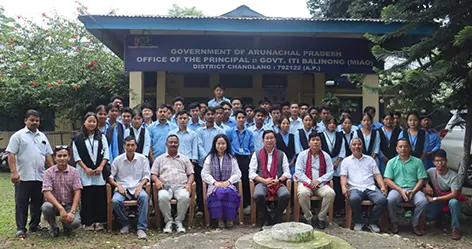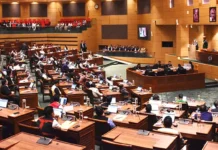BALINONG, 20 Jun: Adviser to the skill development and entrepreneurship (SDE) minister, Dr Mohesh Chai and his delegation assessed the extent of the recent flood damages caused by the overflowing Buri Dihing river, which has severely affected the Industrial Training Institute (ITI) infrastructure here in Changlang.
The boys’ hostel had to be vacated, while additional infrastructure, including three Type II quarters, the bachelor barracks, and the water tank have been completely washed away.
The visit highlighted the need for resilient infrastructure planning to safeguard and enhance the skill-building facilities to improve the learning environment, and to equip the trainees not only with technical expertise but also with the mindset to become job creators, innovators, and contributors to the region’s socioeconomic development.
Earlier, talking to students, he emphasised on strengthening academic and employment linkages and stressed the importance of aligning skill development courses with local industry needs and enhancing placement support for trainees.
Accompanied by SDE Secretary Bullo Mamu and Director Sibo Passing, Chai stressed on motivating the trainees, so that they don’t have to depend on government jobs only. “They should be moulded as job givers not job seekers,” he said, and encouraged the faculty members to instil entrepreneurial thinking among the trainees.
Chai inspected the training workshops, classrooms, and hostel facilities, followed by in-depth interactions with the trainee students and vocational instructors to understand the effectiveness of the training modules and employment linkage opportunities.
The SDE secretary spoke on curriculum modernization, digital literacy, and institution-industry linkages. She emphasized the need for strategic tie-ups and sustained engagement with regional employers to strengthen industry alignment and improve placement outcomes for graduating trainees.
The SDE director conducted a detailed review of the enrolment patterns, trade-wise instructor deployment, and ongoing requirements for upgrading the workshop equipment, especially for trades that cater to high-demand sectors.





